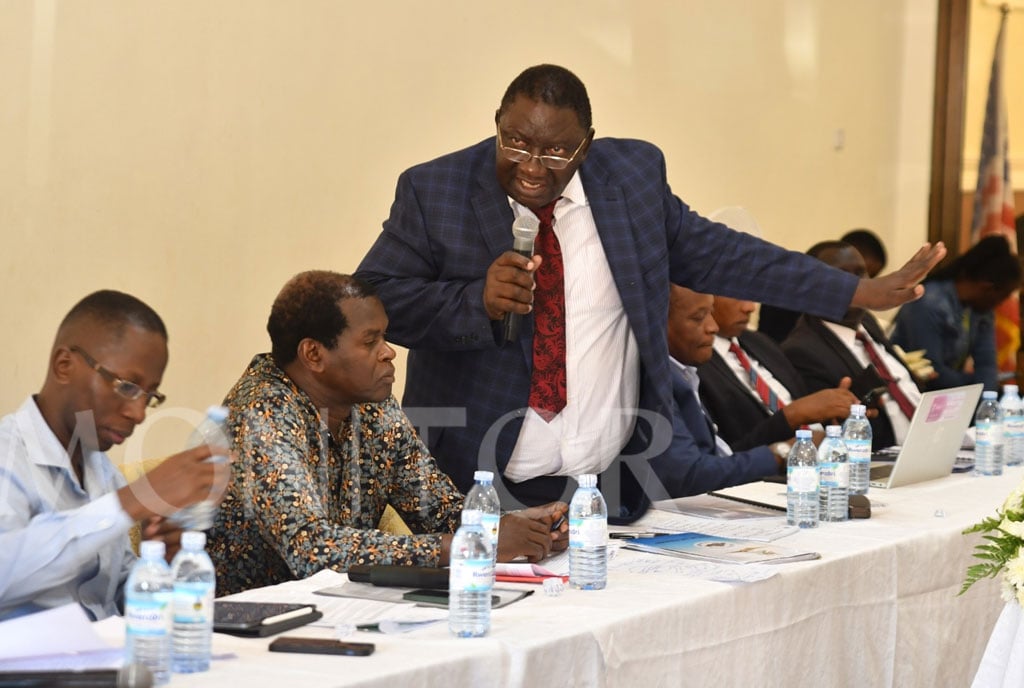How human activities have destroyed Mpologoma wetland

District leaders and officials from Ministry of Water and Environment during the launch of dermacation exercise of Mpologoma- Namakoko – Nangode wetland in Namutumba District on Friday. PHOTO/FRED WAMBEDE
What you need to know:
- Wetland coverage. Uganda’s wetland coverage has dropped from 17.5 percent in the early 1990s to 8.5 percent, while forest coverage has dropped from 24 percent to 12.4 percent due to human activities.
Mpologoma wetland, one of the most biodiverse ecosystems in the country, is facing massive destruction due to human activities.
The activities include growing of rice, sugarcanes, and other crops on a large scale in various districts in the sub-regions of Bukedi and Busoga. This has left River Mpologoma at a risk of extinction.
River Mpologoma receives water from Mt Elgon and carries it to Lake Kyoga.
The river has many swamps, lagoons and tributaries, which have been under increasing encroachment for decades now.
Mr Swaibu Mutyaba, an elder and resident of Namakoko A Village in Namutumba District, attributed the degradation of the wetland to population pressure.
“Our children don’t have land on the mainland. That is why they have descended on the swamps. Apart from rice and sugar, they are now growing tomatoes and maize,” Mr Mutyaba said at the weekend.
He said whenever it rains, floods destroy people’s gardens and homes on the mainland.
“We never used not to experience floods before,” Mr Mutyaba said.
Mr John Kalego, another resident and rice farmer, acknowledged that their activities have degraded the environment but said what matters most to them is their livelihoods.
“The only thing I inherited from my father is a piece of land in the wetland and that is where I earn a living to sustain my family,” Mr Kalego said.
Mr Kalego added that it will be hard for them to move out of the wetland unless overnment provides for them better and more profitable alternative sources of income.
In August, government banned with immediate effect the growing of rice and other crops in wetlands across the country.
In a resolution passed by Cabinet and communicated by the Minister of State for Environment, Ms Beatrice Anywar, government said this is done to restore the environment that has been affected by these activities.
Mr Bosco Mwigo, another rice farmer, said evicting them from the wetlands will increase criminal activities in the communities.
“Most of the youth are growing rice and evicting them from the wetlands will mean promoting criminality in the communities,” he said.
Mr Patrick Mutyaba, the Namutumba District vice chairperson, said they have engaged the locals to vacate the wetlands.
“They are willing to vacate the wetlands because they have also experienced the effects of climate change due to wetland degradation,” Mr Mutyaba said.
Mr Richard Kyambadde, the principal wetlands officer in the ministry of water and environment, said the restoration of wetlands is key in the prevention of floods and drought.
“The wetland degradation is mainly driven by cultivation both domestic and commercial in the eastern region and it is the main cause of rampant floods and drought,” he said.
Mr Kyambadde made the remarks during the launch of the demarcation of Mpologoma- Namakoko – Nangode wetland in Namutumba District at the weekend.
The restoration, which is being funded by the Green Climate Fund (GCF) and United Nations Development Programme (UNDP), is aimed at increasing the resilience of ecosystems.
“We will deliver water to the people on the upper side of the land so that they are able to cultivate outside the wetland,” Mr Kyambadde said.
Mr Deo Kabaalu, the senior wetlands officer for eastern region, said more than 2,000 acres of Namakoko wetland and part of Mpologoma wetland, have been degraded due to farming activities.
Nangonde and Nangonde are the most affected sub-counties.
“River Mpologoma has nearly been depleted because of human activities but we don’t want it to go extinct. We are registering the people so that they benefit from other livelihoods,” he said.
Mr Noar Kiire, the Namutumba District information officer, said although government’s intentions are good, locals think otherwise.
“The government’s intention is to preserve the environment and provide locals with other enterprises,” he said.




